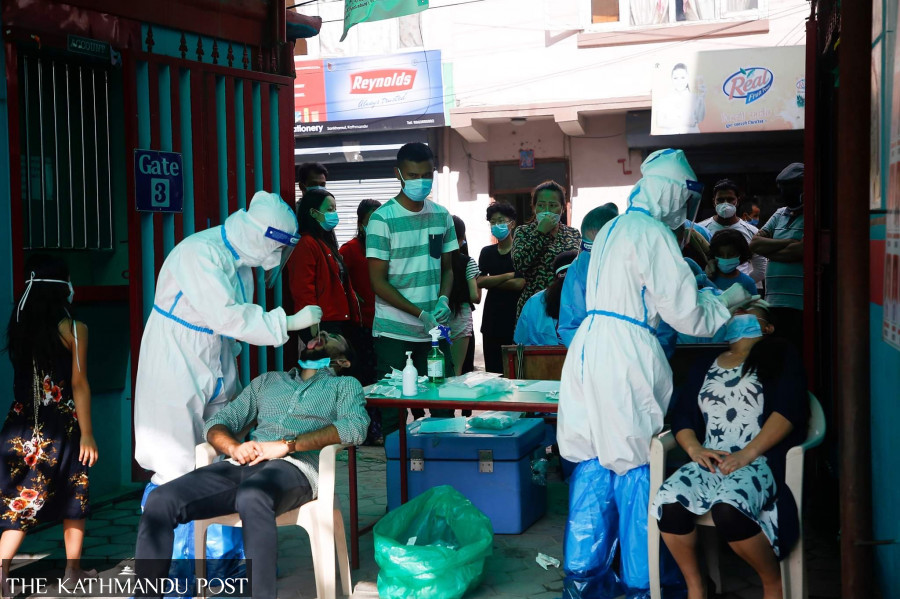Health
Delta variant of coronavirus found in all 48 swab samples sent to India
As the super contagious variant of the virus is spreading in communities, health experts urge both vaccinated and unvaccinated people to take precautions.
Arjun Poudel
The Delta variant of SARS-CoV-2 has been detected in all swab samples of the infected people that were sent for whole-genome sequencing.
This is for the first time the super infectious variant of Covid-19 has been detected in 100 percent swab samples, officials at the Ministry of Health and Population, said.
“Alpha and other variants were found in some swab samples of the infected people in the whole-genome sequencing test performed earlier,” Dr Krishna Prasad Paudel, spokesperson for the Health Ministry, told the Post. “But this time we found the Delta variant in all swab samples.”
The National Public Health Laboratory had collected 48 swab samples from the infected people, who were picked randomly, between July 7 and August 20 in various parts of the country. The samples were sent for the whole-genome sequencing test to the World Health Organisation’s collaborating centre, CSIR-institute of genomics and Integrative Biology in India.
Previously, the India-based lab had detected Alpha variant, the one first reported in the United Kingdom, as well as the variant first identified in Wuhan, China in the swab samples that were sent for whole-genome sequencing test in May and July.
Whole-genome sequencing is a comprehensive method of analysing the entire DNA sequence of an organism’s genes. Researchers believe that whole-genome sequencing of the coronavirus could be instrumental in tracking the severity and properties of the virus.
Although some labs in Nepal can carry out whole-genome sequencing tests, the Health Ministry has been sending swab samples to the UN agency’s collaborating centre.
“Now we can conclude that the second wave of the pandemic was caused by the Delta variant,” said Paudel. “A lot of people have already been infected with the variant in Nepal.”
Studies suggest that the Delta variant known as B.1.617 and its lineages are most contagious among all known variants to date and possibly 40 to 60 percent more transmissible than the Alpha variant of the coronavirus.
A Chinese study has reported that viral loads in Delta infections were 1,000 times higher than those in infections caused by other variants.
The World Health Organisation classified the Delta variant as a variant of ‘global concern' on May 10. The variant has already reached most of the countries.
“The Delta variant is responsible for the ongoing coronavirus infection in our country and this variant is more contagious than other variants,” Dr Runa Jha, director at the National Public Health laboratory, told the Post.
“This variant can infect the people who were already infected with other variants and also those fully immunised.”
Experts say that the highly contagious variant of the virus has taken hold in the communities and people could still get infected with the virus and die consequently.
“Still 80 percent of the population has yet to be fully vaccinated,”said Dr Bhagwan Koirala, chairman of Nepal Medical Council. “Time has not come yet to let the guard down. We should learn to live with the coronavirus.”
Experts from the World Health Organisation said that the Delta variant of the virus is still ‘most concerning’ due to its high transmissibility.
“I think the Delta variant for me is the one that's most concerning because of the increased transmissibility,” said Dr Maria Van Kerkhove, the WHO’s technical lead for Covid-19, during an online question and answer session. “It's doubly transmissible compared to the ancestral strain, which means that it can spread to more people.”
Of late, numbers of new infections and deaths have declined in Nepal. However, several districts including those in Province 1 have a high test positivity rate. Of the 816 polymerase chain reaction tests performed in the last 24 hours in the province, 206 test results came back positive, which is over 25 percent of the total tests performed.
In Dhankuta, results of five of the eight swab samples came back positive, which puts the positivity rate at 63 percent.
So far, 5,729,789 people (over 19 percent) have taken the first vaccine dose and 5,102,244 people (over 17 percent) have been fully vaccinated.
“We should not forget that even the vaccinated people are getting infected and transmitting the virus to others, though severity and death rates in the vaccinated group are comparatively lower than in those unvaccinated,” said Koirala. “Those who are yet to get vaccinated fully should take maximum precaution. Meanwhile, those who have been fully vaccinated should also take precautions to avoid infecting the people who are not vaccinated.”




 18.12°C Kathmandu
18.12°C Kathmandu















